MacJannet Prize 2009 Winners
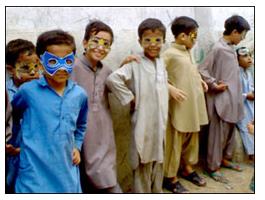 The first place winner, which received $5,000, was the Urban Health Program based in Aga Khan University in Pakistan. This innovative and long-standing program run by Aga Khan University’s Department of Community Health Sciences provides critical health and socio-economic support to the squatter settlements of Karachi.
The first place winner, which received $5,000, was the Urban Health Program based in Aga Khan University in Pakistan. This innovative and long-standing program run by Aga Khan University’s Department of Community Health Sciences provides critical health and socio-economic support to the squatter settlements of Karachi.
Administrators at Aga Khan University founded the program in 1983, when public health efforts received little attention from other Pakistani universities. Since the establishment of the Department of Community Health Sciences, whose mandate was to help develop community-based knowledge and skills among its students, many other medical schools have used the Urban Health Program as a model for their own public health work. Indeed, the program is a model for all sustainable university-based civic engagement programs. The communities involved have been mobilized to form their own management organizations and initiate micro-credit and skill building projects. Many graduates, inspired by their hands-on work through the Urban Health Program, now serve in ministries of health or find other ways to continue their commitment to public health and poverty alleviation. The $5,000 monetary prize will be used to further the program’s inspiring work. Learn more.
The second place winners, who each received $2,500, are Université Saint-Joseph’s Opération 7ème Jour (Operation 7th Day) in Lebanon and Cape Peninsula University of Technology’s Theewaterskloof International Community Development Project in South Africa.
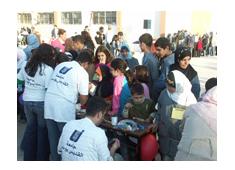 The Rector of the Université Saint-Joseph, Professor René Chamussy, launched Opération 7ème Jour in response to the humanitarian crisis brought on by the 2006 war in Lebanon, engaging students, faculty, and staff in volunteer activities to provide immediate assistance to the population of South Lebanon. Since 2006, Opération 7ème Jour has transformed from an emergency relief effort to a large-scale development program with activities across Lebanon. Working closely with NGOs, government agencies, and local authorities, the program has continued and expanded its solidarity activities, managing development and health care initiatives in an even larger geographic area, with contributions from faculty and students from every academic discipline. Learn more.
The Rector of the Université Saint-Joseph, Professor René Chamussy, launched Opération 7ème Jour in response to the humanitarian crisis brought on by the 2006 war in Lebanon, engaging students, faculty, and staff in volunteer activities to provide immediate assistance to the population of South Lebanon. Since 2006, Opération 7ème Jour has transformed from an emergency relief effort to a large-scale development program with activities across Lebanon. Working closely with NGOs, government agencies, and local authorities, the program has continued and expanded its solidarity activities, managing development and health care initiatives in an even larger geographic area, with contributions from faculty and students from every academic discipline. Learn more.
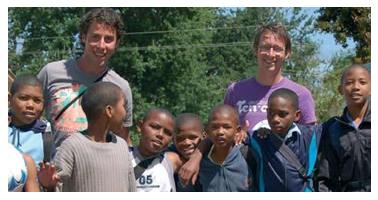 Cape Peninsula University of Technology’s Community Development Project is founded on strong partnerships with the HAN University in the Netherlands, the University of the Western Cape and Elgin Learning Foundation in South Africa, and the Theewaterskloof Municipality. Dutch and South African students collaborate to identify community needs and design their own service-learning projects that build on their areas of study. Projects include building the capacity of municipal agencies to provide services, initiating arts and educational activities in local schools, and providing health education and life skills training to young people. This program provides a strong example of how a university can institutionalize civic engagement work by incorporating all faculties and creating partnerships. The cross-cultural component also makes this program unique, and both the Dutch and South African students benefit from their collaboration and shared learning experiences. Learn more.
Cape Peninsula University of Technology’s Community Development Project is founded on strong partnerships with the HAN University in the Netherlands, the University of the Western Cape and Elgin Learning Foundation in South Africa, and the Theewaterskloof Municipality. Dutch and South African students collaborate to identify community needs and design their own service-learning projects that build on their areas of study. Projects include building the capacity of municipal agencies to provide services, initiating arts and educational activities in local schools, and providing health education and life skills training to young people. This program provides a strong example of how a university can institutionalize civic engagement work by incorporating all faculties and creating partnerships. The cross-cultural component also makes this program unique, and both the Dutch and South African students benefit from their collaboration and shared learning experiences. Learn more.
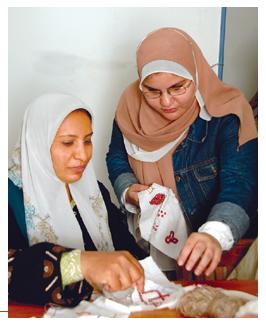 The third place winners, who each received $1000 to fund their programming, are described below:
The third place winners, who each received $1000 to fund their programming, are described below:
Alashanek Ya Balady (For you, my country) at the American University in Cairo in Egypt was established by AUC students in 2002 and is the community service entity of the AUC’s Student Union. AYB’s aim is to develop the society of old Cairo, expand the horizon of the average citizens and families there and finally provide opportunities for those who want to improve their situations. The primary activities of the program are eradicating illiteracy, micro-credit, youth development, national educational program, English development, and computer learning. Chapters of AYB have also opened at four other universities in Cairo, and a registered NGO has been established to coordinate an expansion of their programs. Learn more.
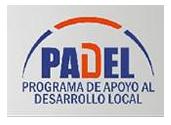 The Assistance Program for Local Development (PADEL) at the Universidad Señor de Sipan in Peru promotes local development through the implementation of service-learning courses in every faculty. PADEL was formed in collaboration with the university, municipalities and civil society organizations and encompasses almost every community surrounding the university. Projects under the umbrella of PADEL include technical assistance for communities on the use of technology, training and management on the use of cultural resources for tourism and mentoring programs for children living in rural impoverished areas. Students are so dedicated to the projects they have implemented that over 50% continue working with their community partners after the course ends. Learn more.
The Assistance Program for Local Development (PADEL) at the Universidad Señor de Sipan in Peru promotes local development through the implementation of service-learning courses in every faculty. PADEL was formed in collaboration with the university, municipalities and civil society organizations and encompasses almost every community surrounding the university. Projects under the umbrella of PADEL include technical assistance for communities on the use of technology, training and management on the use of cultural resources for tourism and mentoring programs for children living in rural impoverished areas. Students are so dedicated to the projects they have implemented that over 50% continue working with their community partners after the course ends. Learn more.
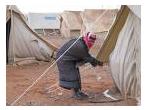 The Human Rights Clinic at Al-Quds University in Palestine was launched in September 2006 in order to give law students at Al-Quds University a chance to study human rights issues in Palestine within the context of international law, while at the same time receiving training in human rights advocacy from some of the top Palestinian human rights NGOs. Students in the program gain practical experience while providing important legal services to the community and helping Palestinian NGOs oppose human rights abuses. The overall goal of the Clinic is to expose students to the various ways used to defend and promote respect for human rights. Learn more.
The Human Rights Clinic at Al-Quds University in Palestine was launched in September 2006 in order to give law students at Al-Quds University a chance to study human rights issues in Palestine within the context of international law, while at the same time receiving training in human rights advocacy from some of the top Palestinian human rights NGOs. Students in the program gain practical experience while providing important legal services to the community and helping Palestinian NGOs oppose human rights abuses. The overall goal of the Clinic is to expose students to the various ways used to defend and promote respect for human rights. Learn more.
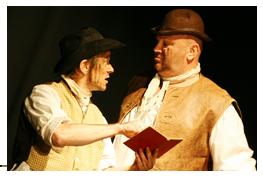 The Playing for Time program at the University of Winchester in the U.K. brings students engaged in community theater courses into the local prison to produce a play in collaboration with prisoners and professional staff. Plays staged in Winchester Prison are chosen for their content so that prisoners can draw parallels between the events and characters in the play and make links with their own lives and experiences which might have led them into patterns of offending behavior. All work delivered through the theatre projects is accredited and prisoners receive certification which can be shown to prospective employers. For many men, engagement with this work is the first time they have gained any kind of educational qualification, having dropped out of school at a young age. The program has led to powerful and long-lasting relationships between the prison, the university and the graduates of the program. Learn more.
The Playing for Time program at the University of Winchester in the U.K. brings students engaged in community theater courses into the local prison to produce a play in collaboration with prisoners and professional staff. Plays staged in Winchester Prison are chosen for their content so that prisoners can draw parallels between the events and characters in the play and make links with their own lives and experiences which might have led them into patterns of offending behavior. All work delivered through the theatre projects is accredited and prisoners receive certification which can be shown to prospective employers. For many men, engagement with this work is the first time they have gained any kind of educational qualification, having dropped out of school at a young age. The program has led to powerful and long-lasting relationships between the prison, the university and the graduates of the program. Learn more.
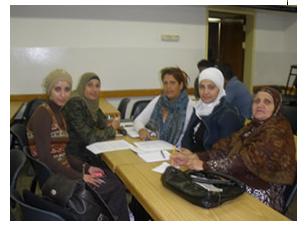 The Women Legal Leaders/Legal Feminism Clinic at the University of Haifa in Israel is a fresh approach to the traditional clinical legal education model. In addition to making clinical placements of law students from the university with community organizations, it helps female leaders in disadvantaged communities to realize their own visions of establishing projects and nascent NGOs to focus on particular social needs, such as opposing honor killings, rehabilitating women in prostitution, and advocating for the rights of divorced women in minority communities. It therefore creates strong links between the university and the community and empowers women to develop their communities. Learn more.
The Women Legal Leaders/Legal Feminism Clinic at the University of Haifa in Israel is a fresh approach to the traditional clinical legal education model. In addition to making clinical placements of law students from the university with community organizations, it helps female leaders in disadvantaged communities to realize their own visions of establishing projects and nascent NGOs to focus on particular social needs, such as opposing honor killings, rehabilitating women in prostitution, and advocating for the rights of divorced women in minority communities. It therefore creates strong links between the university and the community and empowers women to develop their communities. Learn more.